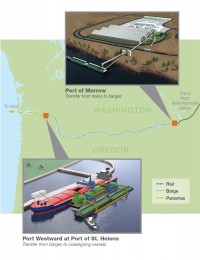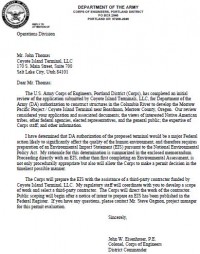OVERVIEW
Scientists at the Army Corps of Engineers (Corps) Portland office determined that the Morrow Pacific coal export project required a full environmental review, called an Environmental Impact Statement (EIS). Nevertheless, the Corps’ Washington D.C. office quashed this important decision. Without an EIS, there will be no more public involvement in the Corps’ decision-making process and the Corps will not take a hard look at the impacts of the Morrow Pacific coal export project, located on the Columbia River. Thousands of Oregonians, as well as state and federal officials, told the Corps that an EIS was necessary:
“I am writing to request that a federal agency prepare a programmatic and comprehensive environmental impact statement under the National Environmental Policy Act.”
Oregon Governor John A. Kitzhaber, MD“I support an expedited programmatic EIS.”
United States Senator for Oregon Jeffrey A. Merkley“I strongly encourage the U.S. Army Corps of Engineers (USACE) to conduct a full impact statement.”
United States Senator for Oregon Ron Wyden
KEY FACTS
- Officials in the Corps’ Portland office decided that an EIS was required by law, wrote a detailed memo justifying the EIS, and drafted a letter to the coal company, Ambre Energy, explaining that decision. (See FOIA Documents marked USACE 121–133).
- Corps’ Washington D.C. office severely criticized the EIS approach, and told the Corps’ Portland office not to announce that it would prepare an EIS. (See FOIA Documents marked USACE 191–200).
- Shortly afterward, the Corps’ Portland office quietly told Ambre Energy and others that it would not prepare an EIS.
RIVERKEEPER STATEMENT
“These FOIA documents confirm that coal export is harmful to our river. The Corps’ questionable approach highlights the importance of strong state-level review. Oregon and Washington should exercise their full authority to deny coal export terminals because the Corps has proven unreliable to take a hard look at the environmental and human health risks. It is discouraging that the Corps’ Washington D.C. bureaucrats meddled with the technical decision about the impacts of the proposed coal export terminal. The Corps should re-commit to preparing an EIS for the Morrow Pacific Project if the permitting process moves forward.”
Executive Director of Columbia Riverkeeper, Brett VandenHeuvel
CURRENT STATUS OF MORROW PACIFIC COAL EXPORT PROJECT
The Oregon Department of State Lands denied Ambre Energy a permit to build the dock for the Morrow Pacific project. Similar to the Portland Corps’ initial conclusion, Oregon determined that coal export had a significant impact on the Columbia River, including salmon fishing. Ambre Energy has appealed Oregon’s decision and the Corps is delaying its federal permitting process until that appeal is resolved.
WHAT’S NEXT?
The State of Washington is currently cooperating with the Corps to study the environmental impacts of coal export terminals in Longview, Washington and near Bellingham, Washington. The FOIA documents obtained in this case demonstrate that Washington’s officials and citizens cannot rely on the Corps to take a hard look at the impacts of coal export.
KEY DOCUMENTS OBTAINED VIA FOIA CASE:
- Document 133: Letter from Colonel Eisenhauer, Army Corps Portland District Commander, to Ambre Energy (Coyote Island Terminal) stating that the coal export project requires an Environmental Impact Statement (EIS) because of the significant impacts. This letter was never sent.
- Document 191: Email exchange between Corps Portland office and Corps Headquarters in Washington D.C. Headquarters stopped the release of the announcement of the Environmental Impact Statement. Note that Jennifer A. Moyer, copied on the email, is the Acting Chief of the Corps’ Regulatory Program—the top official for Corps permitting in the nation. In edits to the Communications Plan below the emails, Ms. Moyer questioned the need for an EIS, even after the Portland-based scientists concluded an EIS was necessary after months of reviewing the project.
- Document 226:Excerpts of a draft “Memorandum for the Record” (MFR), written by Corps Portland staff. The MFR is the official document the Corps uses to explain the need for a full Environmental Impact Statement.
RESOURCES:
- Key Documents in Corps' Coal Export Decision
- Fact Sheet
- 2014.8.14 Opinion and Order in Morrow Pacific EA-EIS FOIA Case
ABOUT THE CRAG LAW CENTER
Columbia Riverkeeper was represented in the case by Chris Winter of the nonprofit Crag Law Center and Miles Johnson, Clean Water Attorney for Columbia Riverkeeper. To preserve the diverse ecosystems of the Northwest for future generations, Crag ensures equal access to justice by providing its clients with professional legal services for free or as close to free as possible, implementing a unique model of “legal aid for the environment.” In addition to litigation, Crag helps clients with assistance on civic participation, campaign strategies, communications, organizing and media relations. For more information go to crag.org.
Additional Information:




